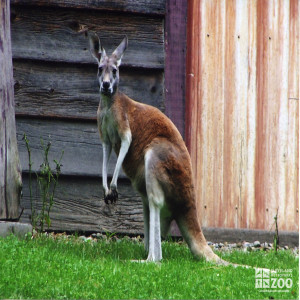Red Kangaroo
[Macropus rufus]

Faithful to the family name (Macropodiea means big foot), the red kangaroo has large elongated hind feet that enable the animal to make great leaps. The “red” part of the name refers to the fur of the male’s back and chest, which turns a brilliant red during the breeding season. At other times the male is mostly gray or brown. The females are colored gray or blue-gray at all times. Mature males may be twice the size of females.
An adult kangaroo can travel at 40 m.p.h. for short distances, leap 27 feet at a bound, and clear a 10-ft. high fence if pressed. Like all marsupials, red kangaroos are born in an extremely immature state. A male is called a boomer, a female is a blue-flyer, a baby is a joey, and a group of kangaroos is called a mob.
Location: Wallaby Walkabout
Share:
Range
The red kangaroo's range is Australia.
Habitat
Red kangaroos inhabit grasslands, with no trees or brush.
Conservation Status
Least ConcernPrimary Threats
Gestation
Gestation for red kangaroos lasts about 33 days, then about 240 days in the pouch.
Litter
Litter size for the red kangaroo is 1.
Behavior
An adult red kangaroo can travel at 40 m.p.h. for short distances, leap 27 feet at a bound, and clear a 10-ft. high fence if pressed. However, kangaroos panic easily and may bunch up against a fence they could clear if they tried. They are mostly grazers but seek the shelter of woodlands when alarmed. Kangaroos have coped with humans very well and large populations exist at this time, but hunters take a large harvest every year. Their fur is used to make the “koala” dolls that are sold to tourists.
Reproduction
Like all marsupials, red kangaroos are born in an extremely immature state. The baby must crawl without assistance from the birth canal to the pouch. Once there it attaches itself to a nipple which it does not release for 70 days. It first pokes its head out of the pouch at about 150 days, and about 40 days later begins to leave the pouch for short periods. At about 235 to 240 days it leaves the pouch for good. It still suckles until a year old. A singular feature of kangaroos is their ability to suckle an infant in the pouch simultaneously with a departed but yet unweaned joey, while a fertilized egg may be in the uterus and will emerge as a fetus when the oldest joey departs for good.
Wild Diet
Primarily leaves and fruit (wild figs)
